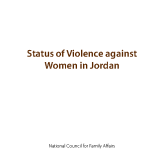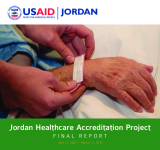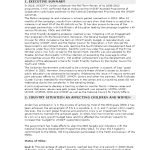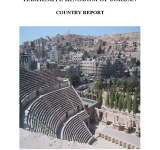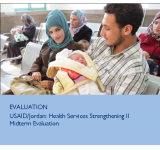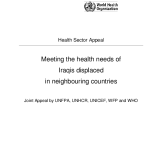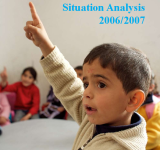Ministry of Health
The report aims to provide an executive summary and major results and accomplishments;; lessons learned and challenges and opportunities of the Jordan Healthcare Accreditation Project (JHAP). The overall goal of the JHAP was to improve the health status of all Jordanians and quality and safety of healthcare services through accreditation. The project's methodology was assisting the Government of Jordan to adopt a regulatory framework for the health sector;; through the establishment of national and internationally recognized healthcare standards and accreditation. The key results of the project include an organizationally and financially sustainable accrediting agency in Jordan;; the Health Care Accreditation Council (HCAC);; an HCAC board with the appropriate skills to govern the agency and support from the Ministry of Health;; the Royal Medical Services;; the university hospitals;; and the Royal Court for accreditation. The report concludes with recommendations for the HCAC in areas such as financial sustainability;; credibility of the organization;; keeping the momentum and new business development and innovation. Some opportunities that the report suggests include expanding in the Middle East and North Africa region;; partnering with well-known quality organizations;; offering courses online and benchmarking subscriptions.
The UNICEF Syria Crisis is a series of bi-weekly report that provides a summary of the humanitarian situation in Syria and development of the organization’s projects in the regions including Syria;; Lebanon;; Jordan;; Iraq;; Turkey and Egypt. The report contains an overview to the changing situations and humanitarian needs of the crisis. It focuses on the results and progress of the UNICEF projects in partnership with other local agencies in each country. These projects aim to ensure sustained access to safe water and sanitation;; provide psychosocial support;; vaccination and school supplies for children and support camps and host community schools for increased school enrollment. Relevant figures that summarize and evaluate the development of ongoing programmes can also be found in the report.
The annual report provides an overview to the country situation in regards to children and women and summary of the humanitarian and developmental assistance of the UNICEF Jordan Country Office (JCO) in 2010. The report includes Jordan’s progress in achieving the Millennium Development Goals in addition to the analysis of the organization’s projects. The projects focus on assisting Iraqi children in education and strengthening young child survival and development and adolescents’ participation and empowerment. The analysis of the report is based on the progress and assessment of the JCO’s projects in partnership with other UN agencies;; local agencies and government ministries. Some highlights of the 2010 annual report include the Ma’An campaign to end violence in school;; the UNICEF’s partnership with the government in supporting Iraqi children in gaining access to public education and a joint programme to develop a tracking system to monitor family violence and abuse cases with other UN agencies and Jordan’s National Council for Family Affairs.
The report was published from the World Health Organization/ United Nations Children’s Fund (WHO/UNICEF)’s pilot project to test a method for the rapid assessment of the quality of drinking-water in six countries;; including Jordan;; China;; Ethiopia;; Nicaragua;; Nigeria and Tajikistan. This assessment report aims to develop a tool that would support WHO/UNICEF’s joint program in strengthening the monitoring efforts of the global access to safe drinking water. The analysis of the report is based on the water samples and statistical data that were collected from 1600 drinking water supply sites in 67 clusters. The report finds that drinking water quality is generally high in the distribution network of Jordan and national standards for bacteria complies with the WHO guideline values. It also identifies the sanitary risk factors for Jordanian water supplies including the presence of sewer lines;; old pipes and failure to properly maintain household storage tanks.
The report presents the findings;; conclusions and recommendations of a midterm evaluation of Health Systems Strengthening (HSS) II;; a five year (2009-2014);; $73 million USAID-funded project. The strategy of the HSS II is to institutionalize strengthened health systems in support of reduced fertility rates and improved women's health. It works with the public health sector;; namely the Ministry of Health;; the Royal Medical Service and the Jordan University Hospital. The report finds that the project has met 13 of its 23 targets for year 3 and is on track to meet all its objectives by the end of the project. Expected results are public sector initiatives in safe motherhood and reproductive health. The HSS II project;; with its close ties with the Ministry of Health for its responsiveness to health needs and integrated approach to health delivery;; has strengthened critical health systems through its support to health management information system;; renovations;; accreditation;; referrals and capacity-building. The report recommends the USAID to negotiate the removal of a requirement that midwives be supervised intrauterine device insertion;; advocate for innovative incentive schemes and varying salary grades that reward midwives and doctors providing FP services and revise project indicators to reflect health outcomes and impact. Further recommendations include continuing support of a broad-scale mass media behavior change and communication campaign and programs that build on gains in maternal and neonatal health.
This joint interagency appeal to the international community seeks a total of US$ 84;;833;;647 million to provide support to national efforts aimed at improving access to health care for displaced Iraqis living in Syria;; Jordan and Egypt. The activities prioritized in the appeal are based on the Common Action Framework agreed upon during the Ministerial Consultation to Address the Urgent Needs of Displaced Iraqis;; convened by WHO in Damascus from 29-30 July 2007.
يهدف هذا التقرير الى تحليل الانجازات التي تحققت للأطفال في الأردن. ويتضمن التقرير معلومات وإحصاءات عن صحة الأطفال والتعليم والمشاركة بالإضافة إلى حماية الطفل. ويشير أيضا الى ما يجب القيام به ويبين ما هي الفجوات. وكان أبرز ما خلص إليه التقرير أن الصحة العامة والصحة الإنجابية ليست موجهة بشكل كاف لاحتياجات المراهقين;; وكما أن التوعية الصحية متدنية بين الفتيات والذكور;; اضافة الى محدودية فرص الحصول على المعلومات والتثقيف حول نمط الحياة الصحي. وأن خدمات رعاية الطفولة تتويسع ببطء مع زيادة الوعي. والاشارة الى نسبة التسرب وعمالة الاطفال;; وشعور الشباب والنساء بخيارات المشاركة المتاحة. وبين التقرير أنه لأطفال اللاجئين الفلسطينيين الحق في الوصول إلى كافة الخدمات. واعتبار أن الفقر وسوء الأحوال الصحية ونقص التعليم;; جميعها عوامل تحرم الأطفال من كرامتهم;; وتهدد حياتهم وتقضي على آمالهم. وكما يقدم التقرير توصيات بشأن ما يجب القيام به لزيادة تحسين حالة الأطفال في الأردن.
